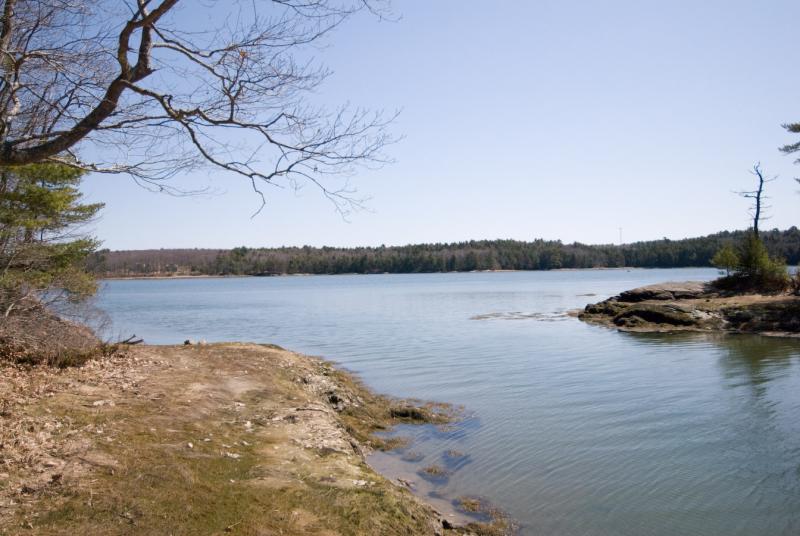I wrote the below article in 1992. Some slight changes were made in usage.
In going through the old court record, many aspects of the old days are revealed, but not without a little wrestling. For instance, from the record alone and ignoring all other sources, one can draw the conclusion that the economy was almost totally dependent on wood. At least wood, in its natural and manufactured forms, seemed to be the major focus in the cases which did not mention a monetary debt. Some cases provide details of vessels, mirror wartime confusion, and illustrate the dominant theme of wood.
In November of 1777, Paul Reed of Boothbay had a 133-ton brigantine, the Nancy, which was “lost out of his hands.” The same day John Borland of Boothbay “possessed it by finding” and was accused of taking and disposing of the vessel and cargo at Matinicus. The cargo consisted of 33,000 white oak pipestaves worth 60 pounds a thousand, 500 hickory handspikes worth 300 pounds, and five pine topmasts worth 120 pounds each. Though the case came up in 1778 and 1779, Reed failed to show up in court and lost by default. If the number of cases involved Paul Reed are any indication, he was much too busy to take time to appear in court.
Paul Reed’s Adventures
Reed is accused over and over of theft from 1777 on up: 10 oxen from Bristol, goods such as rum, hog fat, and coffee from Bristol, the sloop Sally, the sloop Endeavor, the sloop Ranger, and so on. Aside from many accusations of assaulting Ebenezer Fullerton of Boothbay “with guns, bayonets, and swords” and imprisoning him. Paul was also accused of imprisoning without reason William Gilmore of Woolwich.
Paul Reed certainly appeared to be a first class bully, and he was found guilty of all offenses. Only when I placed him properly in perspective in the midst of the Revolution years did things become clearer to me. He must have been commandeering goods and vessels for the war effort in his official capacity with the Seacoast Defense. Perhaps the accepted legal recourse for the people who had their possessions appropriated by the government was to sue, not the government, but the man who did the physical taking, and let him collect from the higher-ups. Though I think the American government intended repayment, by 1781 “Congress had been forced to repudiate its financial obligations on a 40 to 1 basis,” as set forth in the 1961 text, The American Pageant. If a sloop had been your means of livelihood, and you got 1/40th of it back, you were as bankrupt as the country.
Those who lost property for the cause must have been desperate for repayment. And as for Fullerton, he (and the local McGuires) were viewed as “persons inimical who refused to take the oath of fidelity and allegiance”—in other words, a Tory. Again Paul Reed was doing war work as he saw fit, and not simply terrorizing his neighbors and closest relatives. Fullerton and Tom McGuire eventually took the oath and the fine was waived. Maybe when they saw the Americans were winning, the choice was easier for them.
Cross River
A consistent pattern concerning Boothbay showed up in the early years of the Lincoln County Court of Common Pleas. The county was formed in 1760 but not until late 1764 was Boothbay incorporated. Prior to that time the residences of those involved with court cases were given by location, which was a piece of luck for me. My first page of notes covers 16 cases of local significance from 1760 to September of 1763. It didn’t take long for an area of concentration, a bull’s eye of activity, to jump out. Fully a third of the 16 cases involved residents of Cross River, that tract located above Adams Pond and between the Dover Road and Route 27. On top of that, half of all the 16 cases were spread over the Back River, Cross River and Pleasant Cove area.
It seemed to me very odd that Cross River (known also as Oven’s Mouth River), containing maybe a 20th of Boothbay’s land area, bred a third of all cases. And the band of territory covering Back River, Cross River, and Pleasant Cove is less than a quarter of Boothbay’s land area, yet engendered half of all cases. Some of the early Cross River names are: Obadiah Olbey (Albee), John Crommet, Fergus Kennedy, Nicholas West, Soloman Pinkham, and Benjamin Kent. I though to myself, “What a contentious bunch of people” and pictured busybodies rushing around the hotbed of trouble suing themselves silly. That was my analysis of the situation a couple of years ago when I was new at Boothbay history—not particularly thoughtful.
I went on to different matters and didn’t think much about it until I started tracking early landowners up in that area where you bump into Burnhams everywhere. John Borland pops up again for he had a Common Pleas land title go-around with Soloman Burnham just as he had with Paul Reed. I checked the 1772 Sproul map which shows house sites and, all of a sudden, I revised my thoughts on Cross River, no longer seeing the inhabitants as particularly quarrelsome. The real explanation for the profusion of cases was right in front of me on the map—it was the most densely populated area in the region. That makes perfect sense since the best farmland was away from the rocky coast with its thin soil.





























